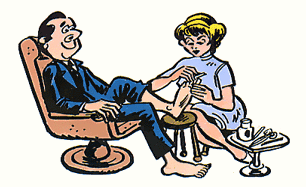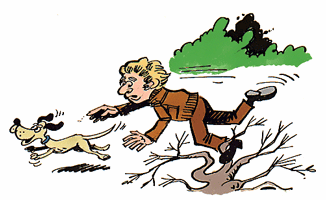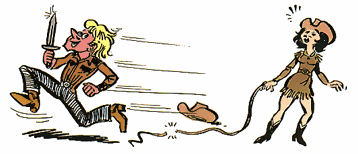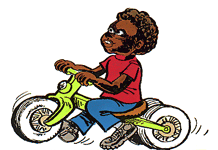Ped Words: “palmiped” to “velocipede”,
Part 2 of 2
Words that include: ped-, pedi-, -pedal, -ped, -pede, -pedia (Latin: foot, feet)
Remember that this Latin ped- means “foot” while the Greek ped- [paed] means “child”.
palmiped, palmipede:
A web-footed bird.
pedal:
1. A lever worked by the foot, in various musical instruments, and with various functions.
2. Of, pertaining to, or connected with the foot or feet.
3. To work the pedals of a bicycle, etc. so as to propel it.
pedary:
Of or pertaining to the feet or walking.
pedate:
1. Having divisions like toes, or like the claws of a bird’s foot.
2. Furnished with or having feet; footlike.
pedestal:
1. The base supporting a column or pillar in construction; the base on which an obelisk, statue, vase, or the like is erected.
2. A base, support, foundation (material or immaterial).
pedestrial:
A reference to the feet; employing the foot or feet.
pedestrian:
1. On foot, going or walking on foot; performed on foot; of or pertaining to walking.
2. Representing a person on foot, as distinguished from equestrian.
3. Applied to plain prose as opposed to verse, or to verse of prosaic character; hence, prosaic, commonplace, dull, uninspired; colloquial, vulgar.
pedestrianize:
To practice walking; to go afoot.
pedetentous:
Proceeding step by step, advancing cautiously.
pedialgia:
Neuralgia (pain) in the sole of the foot.
pedicab:
A small pedal-operated vehicle; usually, a tricycle, serving as a taxi in some countries.
pedicure, pedicurist:
1. One whose business is the surgical care and treatment of the feet; a chiropodist.
2. The surgical treatment of the feet; especially, in the removal or cure of corns, bunions, and the like.
 A pedicurist is giving a man's "peds" a treatment.
A pedicurist is giving a man's "peds" a treatment.
pediferous:
Having feet or foot-like parts; pedigerous.
pediform:
Having the form of a foot: said chiefly of the organs of insects.
pedigerous:
Bearing feet or legs; having feet.
pedigree:
1. A conventional mark consisting of three curved lines, which bears a distinct resemblance to the claws of a bird; specifically, a crane.
2. A genealogical stemma or table; a genealogy drawn up or exhibited in some tabular form.
3. One’s line of ancestors; an ancestral line; ancestry; lineage, descent.
4. Etymologically, pedigree means “crane’s foot”. The idea behind the metaphor is that a bird’s foot, with its three splayed-out toes, resembles the branching lines drawn to illustrate a family tree or pedigree.
pediluvial, pediluvium:
Of or pertaining to the washing of feet, or to a foot-bath; ceremonies connected with the washing of feet (as a religious act).
pedimanous:
Having feet like hands: applied to the lemurs and opossums in reference to their hind feet.
pedionalgia:
Pain in the sole of a foot or feet.
pediphalanx:
A phalanx (bones of the fingers or toes) of a digit of the foot.
peditis:
Pedal osteitis (inflammation of a bone in a foot or the feet).
pedobarograph:
An apparatus for recording dynamic variations in downward pressure by different areas of the sole of a foot as a person stands upright or walks.
pedobarography:
Measurement of dynamic variations in downward pressure by different areas of the sole of a foot, using a pedobarograph.
pedodynamometer:
An instrument for measuring the strength of the leg and muscles.
pedogram:
A record made by a pedograph.
pedograph:
1. An instrument for recording and studying the gait.
2. An imprint on paper of the weight-bearing surface of the foot, surrounded by a pencil-marked contour of the upper foot.
pedomancy:
Divination (fortune telling) by analyzing the soles of the feet.
pedometer:
An instrument for recording the number of steps taken when walking.
pedomotive:
Moved by foot power; a velocipede.
pedopathy:
Any disease of the foot or feet.
pedoplania:
Flattening of the foot or feet.
pedorthics, pedorthic:
The design, manufacture, fit, and modification of shoes and related foot appliances as prescribed for amelioration of painful and/or disabling conditions of the foot and limb.
pedorthist:
A person skilled in pedorthics and practicing its application in individual cases.
pedoscope:
An X-ray machine for showing the fitting and movement of the feet inside shoes (formerly common in shoe shops).
pedule:
A kind of leg covering worn in ancient and early medieval times, made of soft leather, flannel, or the like, and in a shape similar to a high boot.
ped-way; pedestrian way:
A walkway, usually enclosed, permitting pedestrians to go from building to building; such as, in an urban center, without the need for passing through traffic.
ped-Xing:
Pedestrian crossing; a warning to vehicles to yield the right of way to walkers who may be in the process of crossing a street or other roadway.
pinniped:
1. Having feet resembling fins, fin-footed; specifically, belonging to a suborder (Pinnipedia) of Carnivora, comprising the seals and walruses, which have fin-like limbs or flippers; also, belonging to other divisions of animals having limbs or organs resembling fins and adapted for swimming, e.g. the fin-footed or lobe-footed birds, certain decapod crustaceans or crabs, the pteropod molluscs, etc.
2. A pinniped mammal; a seal or walrus.
polyped:
Any creature that has many feet; many footed.
quadruped:
1. An animal that has four feet. Usually a reference to mammals, and excluding four-footed reptiles.
2. Belonging to, connected with, or appropriate to four-footed animals.
 A bipedaling man is impeded by a branch while he is running with his quadruped friend.
A bipedaling man is impeded by a branch while he is running with his quadruped friend.
quadrupedal:
1. Of animals, four-footed; using all four feet for walking or running.
2. Sometimes a reference to a person: on hands and knees.
remiped:
Having feet that are oar-shaped, or used as oars for swimming (a reference to certain insects).
sesquipedalian:
1. Of words and expressions (after Horace’s sesquipedalia verba, “words a foot and a half long”). Of many syllables.
2. A person or thing that is a foot and a half in height or length.
sesquipedalianism:
A style characterized by the use of long words; lengthiness.
sinistropedal:
Denoting someone who uses the left leg in preference to the right; left-footed.
sexiped, sexipede:
Hexapod, with six feet.
suppedaneous:
A reference to the soles of the feet.
talipedic:
Clubfooted.
unimpeded:
Without hindrance or obstruction.
 The man regains his ability to flee unimpeded from the woman
The man regains his ability to flee unimpeded from the woman
who had previously impeded him.
uniped:
A person having only one foot (or leg); a one-footed creature.
velocipede:
Any of various early forms of bicycle or tricycle, including some that had pedals attached to the front wheel or were propelled by pushing the feet along the ground (from Latin veloc-, “swift” plus the stem ped-, “foot”).
 An example of one kind of velocipede in action.
An example of one kind of velocipede in action.